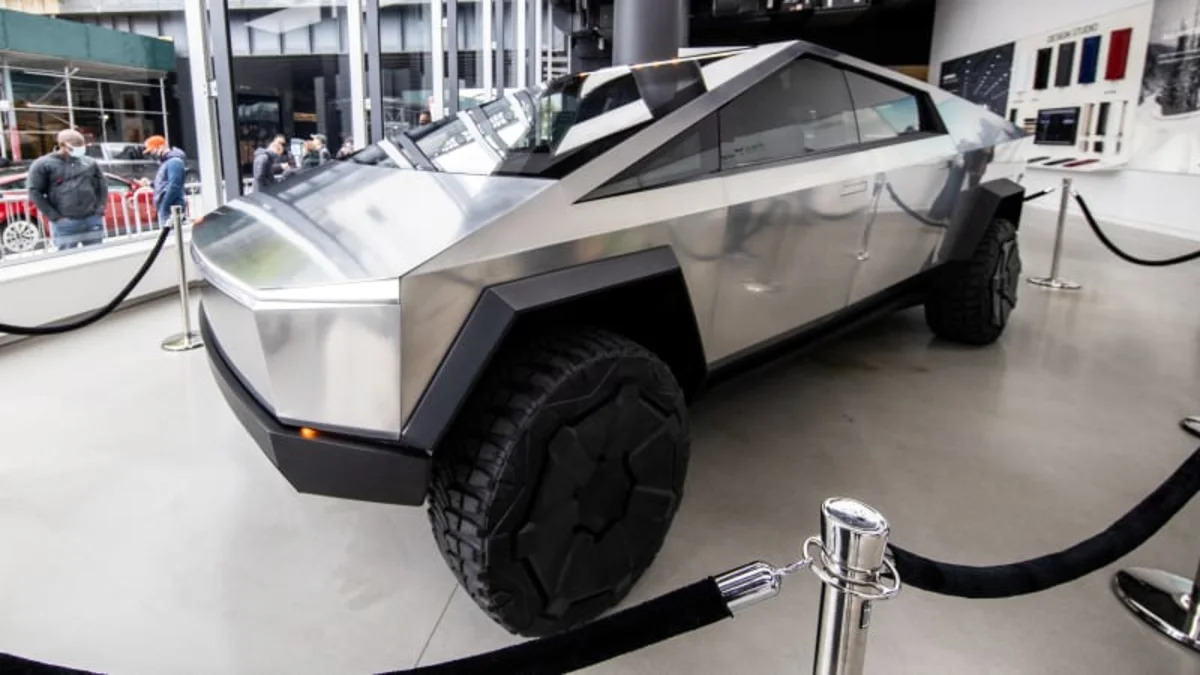UPDATE: Turns out all of the below prognostications regarding the delay of the Tesla Cybertruck were indeed accurate. Although there have been no announcements or statements from the company, a quick glance at Tesla's reservation page for the Cybertruck shows that the fine print now says "You will be able to complete your configuration as production nears in 2022." Interestingly, there are no caveats for the order of production; earlier versions of the configurator page said that the dual- and tri-motor versions would be produced first.
Those anxiously awaiting a new electric pickup truck in their driveways will have to wait a bit longer for the Cybertruck — it's not clear how limited the 2022 production will be or if it will be confined to specific variants — or choose to throw their reservations into the ring for a different alternative, such as the Rivian R1T, GMC Hummer or the attractively priced Ford Lightning. Something tells us, though, that a good number of Cybertruck reservations holders will go ahead and keep their places in line as Tesla's pointy stainless hauler continues through its engineering and production phases.
Our original story continues below ...
As we reported yesterday, Tesla posted a bigger second-quarter profit than expected as it raised vehicle prices and cut costs. In fact, the automaker earned $1.1 billion (or $1.02 per share), in the April-June period — more than 10 times its profit at the same time last year — while revenue nearly doubled from last year to about $12 billion. That's excellent for investors, but customers anxiously waiting for updates on the automaker's upcoming Cybertruck and Semi truck didn't get similarly good news.
In a statement provided to shareholders, the automaker said "we have shifted the launch of the Semi truck program to 2022. We are also making progress on the industrialization of Cybertruck, which is currently planned for Austin production subsequent to Model Y."
When pressed for an update on the timing of the long-awaited Cybertruck electric pickup, Lars Moravy, vice president of vehicle engineering at Tesla, said it "is at a stage where we finished basic engineering of the architecture of the vehicle," and added "we are moving into the beta phases of Cybertruck later this year and we will be looking to ramp up production at Giga Texas after Model Y is up and running."
Put simply, it seems there is very little chance that any Cybertrucks will be delivered before the end of 2021, as was originally announced when the truck debuted in 2019. And the Semi, which was unveiled way back in 2017, has officially been delayed again.
In a call with investors and analysts, Tesla executives said that volume production growth for this year will depend on parts availability, as it aims to grow deliveries by more than 50%.
Musk said Tesla has "many calls at midnight, 1 a.m., just with suppliers about resolving a lot of the shortages."
While some people had suggested Tesla build its own chip fab, he pointed to the long leadtime. "That would take us, even moving like lightning, 12 to 18 months," he said.
Still, Musk said Tesla expects to start limited production this year of the Model Y SUV at factories under construction in Texas and Germany.
"It is difficult to say when the last of the technical challenges will be solved," he said, referring to its 4680 battery cells.
He said Tesla has a backup plan of using its existing 2170 batteries, adding that its battery cell suppliers would double production next year.
During yesterday's announcement, Tesla said operating income rose with volume growth and cost reduction, which offset higher supply chain costs, lower regulatory credit revenue and other items including $23 million in losses on investment in cryptocurrency bitcoin.
Tesla's profitability has often relied on selling regulatory credits to other automakers, but in the second quarter, Tesla was profitable without these credits for the first time since the end of 2019. Its GAAP net income was $1.14 billion in the second quarter. Revenue from the credits only totaled $354 million.
"Tesla impressed with its numbers, as most of its revenue came from vehicle sales," Jesse Cohen, senior analyst at Investing.com, said.
Information from Reuters was used in this report.
Related video:


Sign in to post
Please sign in to leave a comment.
Continue